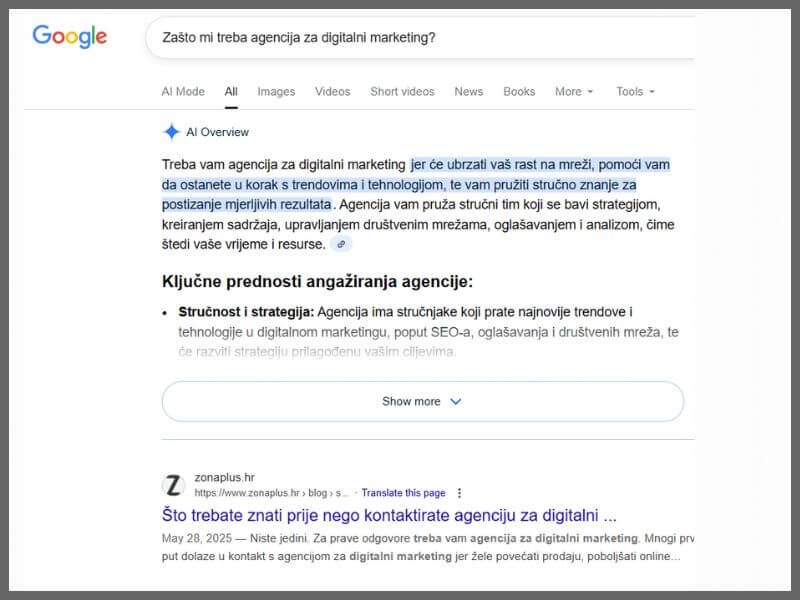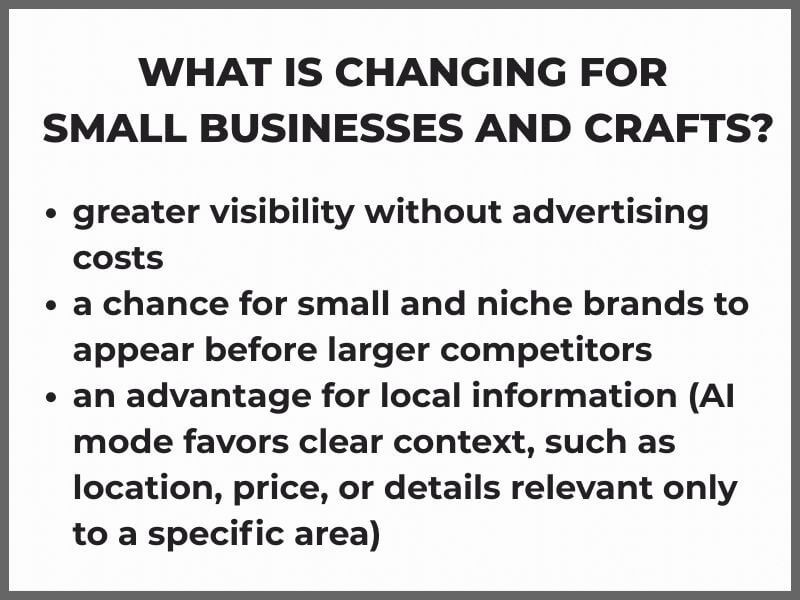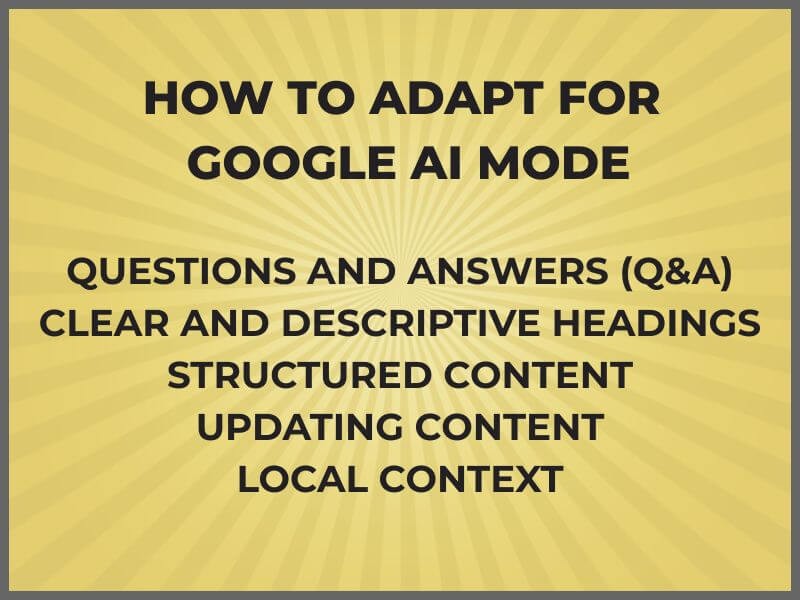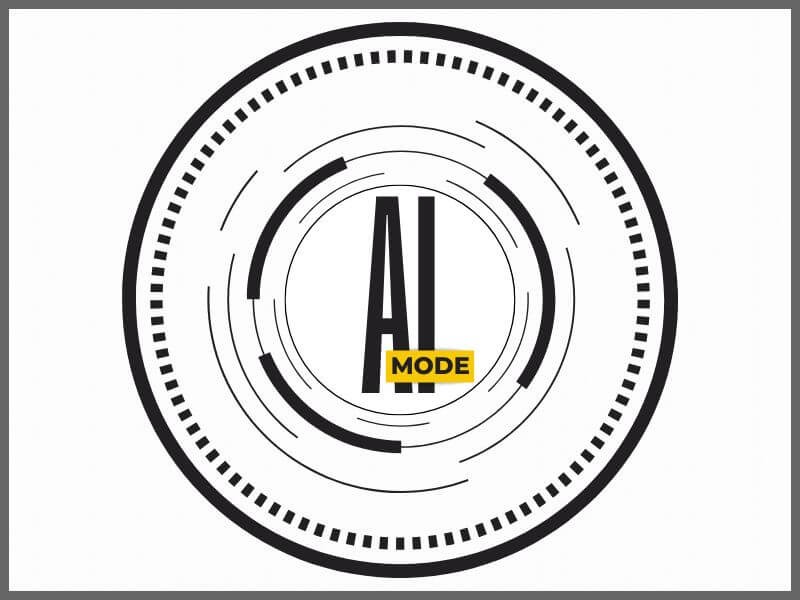
When you open Google, you no longer see just a list of links to websites, articles, and blogs, but you immediately receive an answer to your query, directly within Google itself. No clicking. No scrolling through results. Just: question and answer. That was AI Overview. And now – Google also has AI mode.
Google AI mode is a new way of displaying information in search results.
Instead of a classic list of websites and links, this feature uses artificial intelligence to immediately display a ready answer to the question asked. It is enough to simply click next to “All” on “AI mode”.

And there, in one place, you’ll see summarized steps, recommended products, key tips, and explanations. All of this is based on content from existing websites but presented in a format that is simpler and easier for people to understand.
For example, for a query such as “why do you need a digital marketing agency,” there is no longer a need to open ten different websites and read blogs and articles.
AI mode displays a summary containing all the necessary information. In the case of other queries, such as “how to clean a washing machine,” you’ll get clear instructions, a step-by-step order, and possibly a list of products. It does not display an ad, but a summarized and reworked version of content that Google has identified as the most useful.

Google is under increasing pressure from competitors such as ChatGPT, Perplexity, Copilot, Grok, and other systems that offer fast, simple answers.
People still search for terms and look for specific advice, recommendations, or solutions.
And they want that information immediately, without having to click through multiple websites and waste time searching for accurate details. Google knows this and doesn’t want people going elsewhere for answers.
In addition, human behavior itself is changing. People no longer just search for “digital marketing agency.” Now they ask: “Why do I need a digital marketing agency?” AI mode recognizes that.
And that is why you can no longer rely solely on position in the “old” search results. Your content must be clear, structured, and written in a way that the AI system can identify as relevant. Otherwise, Google may simply skip it.
Google AI mode completely changes the way people access information.
When you click on AI mode, instead of the usual Google results, you get an answer, and on the right side a list of websites and links (from which the answers are taken and summarized), so you can explore further if you wish (and also check whether the information you received is accurate).
This all means:

The content that appears within the AI mode answer might not even be among the top results on Google, but it is:
Google no longer shows only what is well-ranked, but what can immediately serve as an answer. This changes the entire concept of digital visibility.
What does this mean for small businesses and crafts?
If AI mode can provide all the information without additional clicks, the question is whether your website’s content will be the one shown, or whether it will remain invisible.
There are only two possibilities:
Google does not include random sources. It gives preference to content that is:
For small businesses, this means that content needs to be adapted, and quickly. It is no longer enough just to be present online. The content has to do the work for you, and Google needs to recognize it as useful.
If you have a small apartment, a beauty salon, or a business with homemade products, until recently potential guests, clients, or customers would reach you by clicking on an ad, browsing your website, and only then deciding whether to book or buy.
Now the situation is changing.
The decision is often made directly within Google itself, that is, in the AI mode answer window, and the person may never even visit your website.
This means that you are no longer competing with others just for the click, but also for a place within the AI answer. Whoever appears there gains direct contact with a potential guest, client, or customer. Whoever does not appear there can remain completely invisible, even if otherwise ranked high in traditional search results.

What is changing for small businesses and crafts?
Advantages if the content appears in an AI answer:
Risks if the content does not appear:
In other words, Google AI mode changes the rules of search. People make decisions on their own before ever reaching you. That is exactly why the content on your website must be written in a way that Google recognizes its value and includes it in its answers.

Adapting to Google AI mode does not mean that you now need to completely redesign your website or make complex technical changes.
What matters is how the content is written and structured. The goal is to make it easier for Google to recognize the value of your information and use it in AI answers.
Here are a few practical guidelines:
People no longer search using just two words. They ask full questions. Add a section to your website with frequently asked questions and clear answers. For example: “How long does a facial treatment last?”, “What is included in an apartment stay?”, “How to recognize natural honey?” and similar.
Instead of generic phrases like “Our services”, use headings that already contain the answer. For example: “What does a facial treatment include in our salon?”, “What are the benefits of staying in our apartment?” or “Why choose natural products?”.
The AI system “reads” content better when it is divided into subheadings, lists, and shorter paragraphs. Long blocks of text not only confuse the reader but also make it harder for Google to extract what is most important.
If the texts on your website have not been updated for years, they probably no longer respond to current questions. People now ask much more specifically. Your content needs to be adapted to that.
If you operate in a specific area, make sure to mention it. Include the city, neighborhood, or local attraction. AI mode looks for content that is tied to a location and to people’s real needs.
Bad example:
“Welcome to our website. We are the best at what we do, we offer affordable prices and have a professional team.”
Why is it bad?
The text is generic, does not answer any real question, and provides no useful information at the moment of search.
Good example:
“Looking for a massage in Zadar? We offer sports, relaxing, and therapeutic treatments. All you need to do is book in advance. Our working hours are from 8 AM to 6 PM or by appointment. Here is what each treatment includes…”
Why is it good?
It immediately mentions the location, the issue that can be solved (fatigue, pain, need for massage), types of services, and how to access them (reservation).
This is the kind of content AI mode recognizes as relevant, and such a website is more likely to be included in the AI answer.

Google AI mode is not an enemy of small brands, but it is a reminder that the digital space is changing very quickly.
It is no longer enough to have a website or write a few lines of text. There is no more room for generic content that says everything and nothing. Visibility is now built by being genuinely useful to people.
Your content must have a clear purpose. It must answer questions people actually ask. It must be written simply, without unnecessary filler, and structured in a way that is easy to follow.
To begin with, you can do the following:
If you are not sure where to start or do not have time to deal with it yourself, you can contact us. Zona plus helps both small and large brands with clear, specific, and usefully written content.
Together, we can do a short analysis of your website and suggest specific changes that make sense and deliver results.